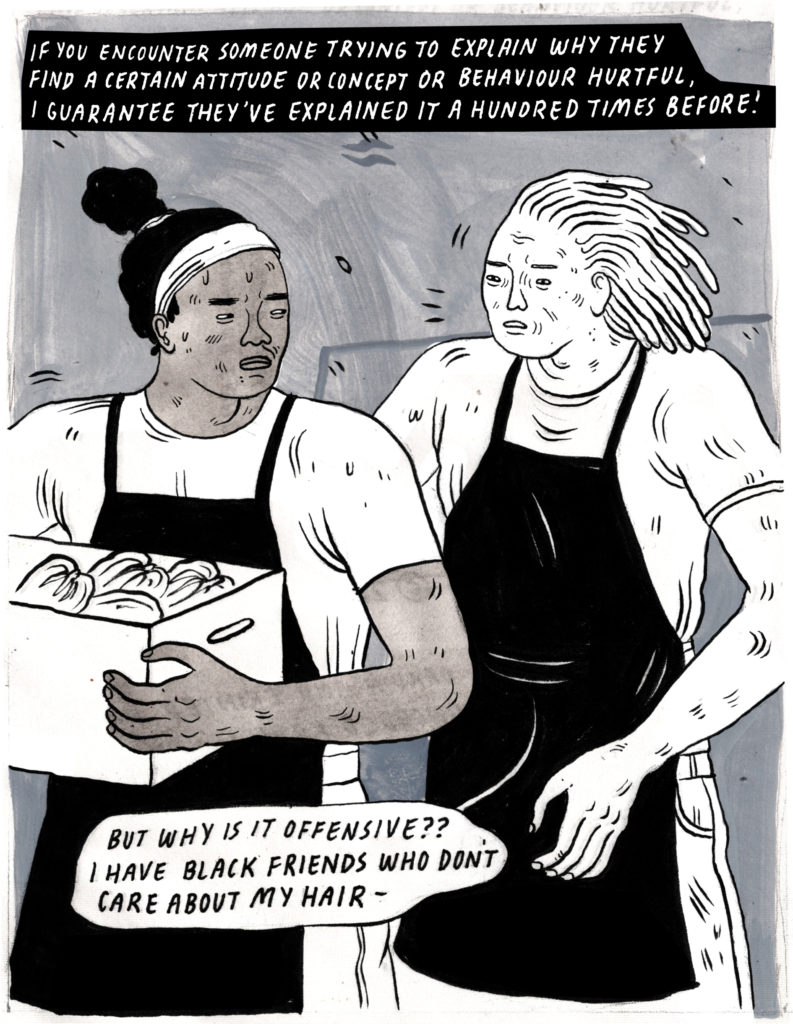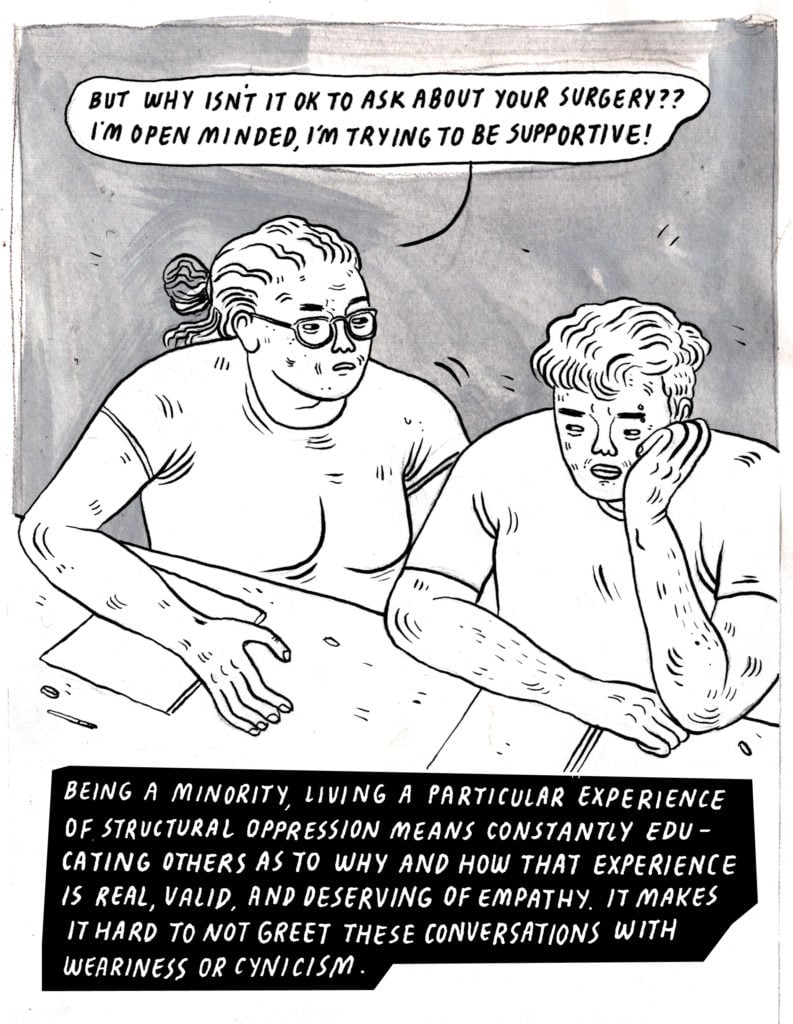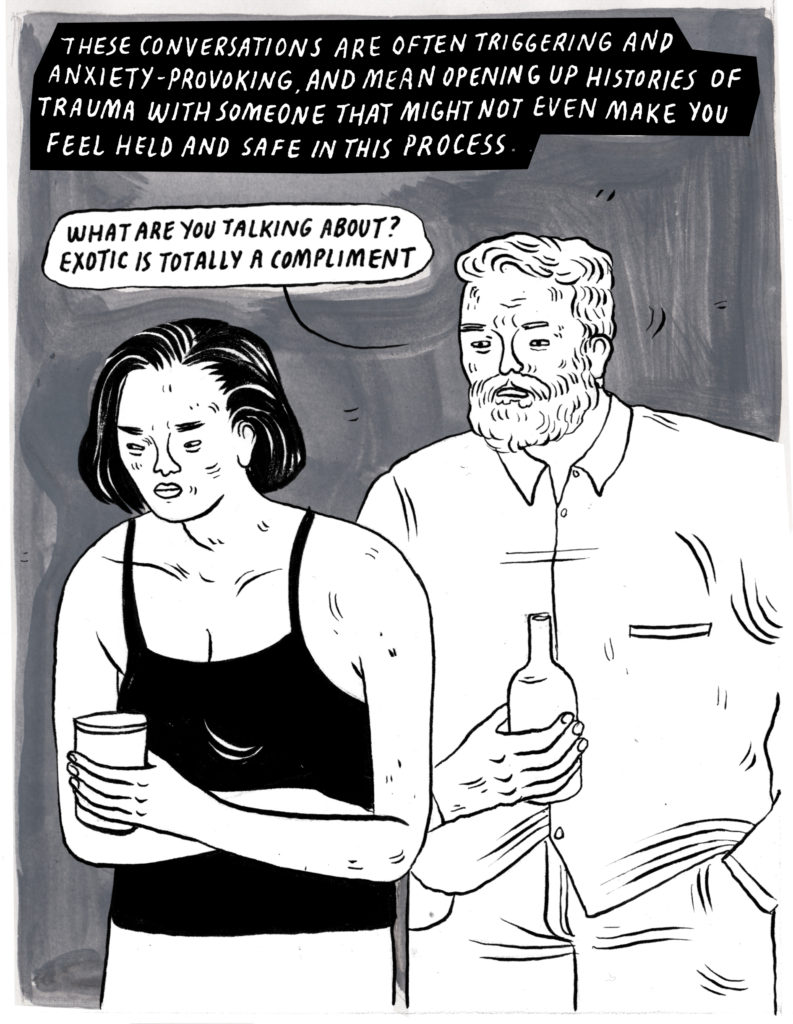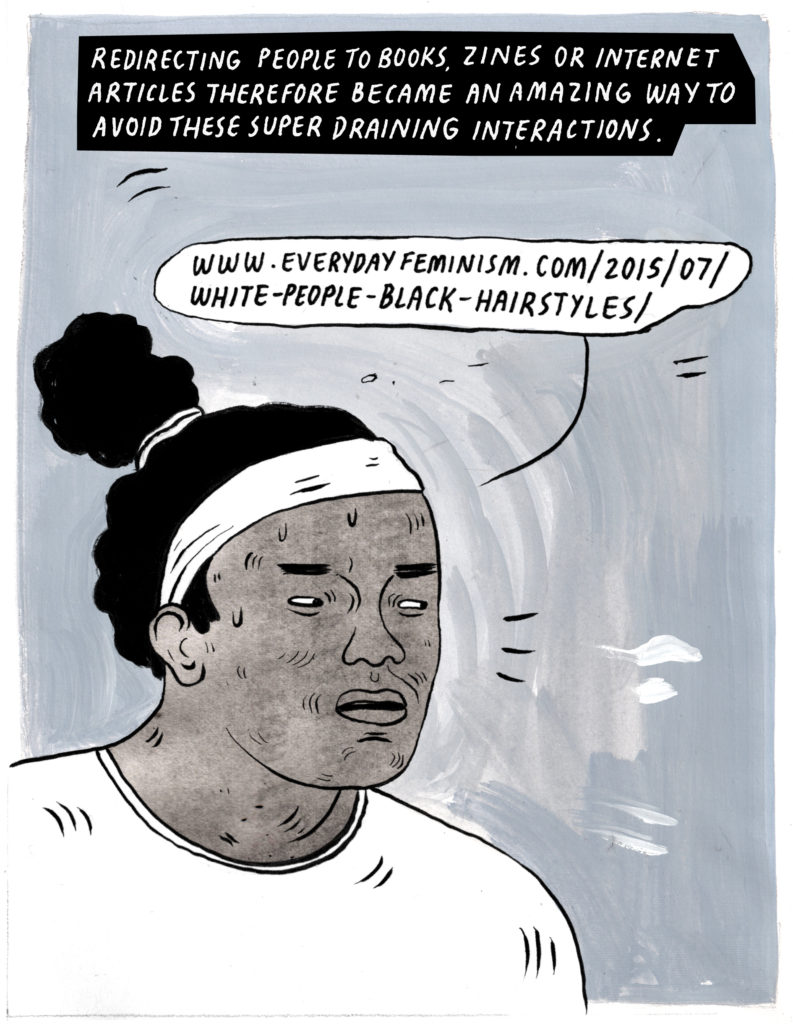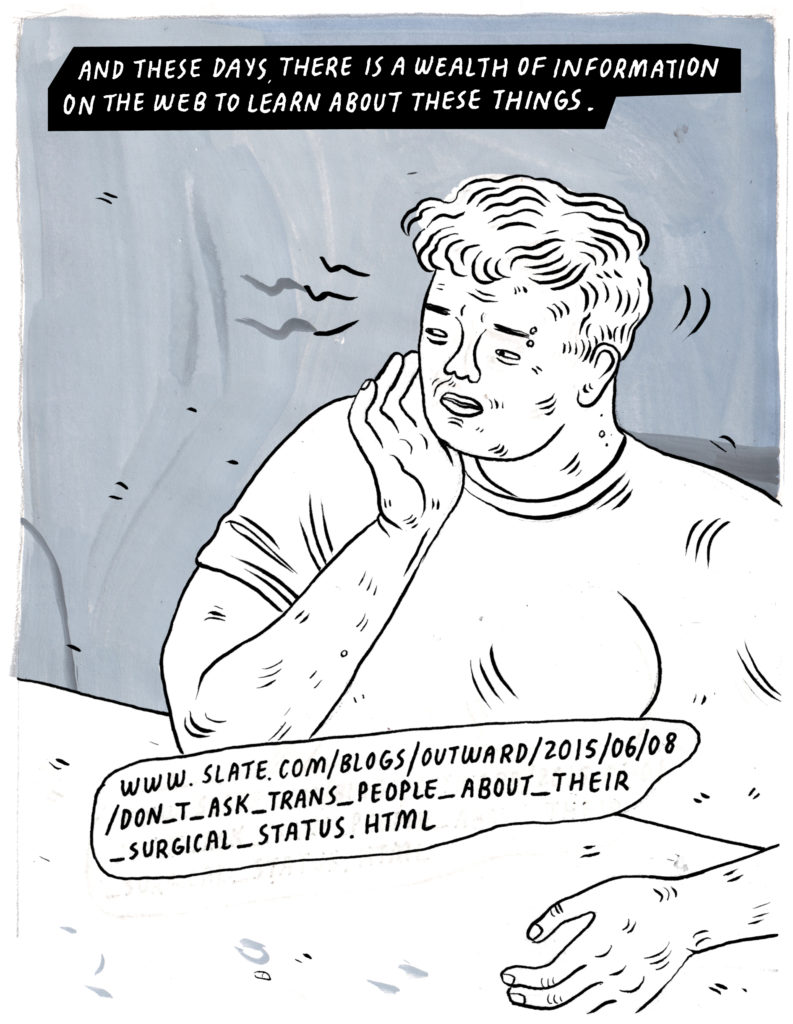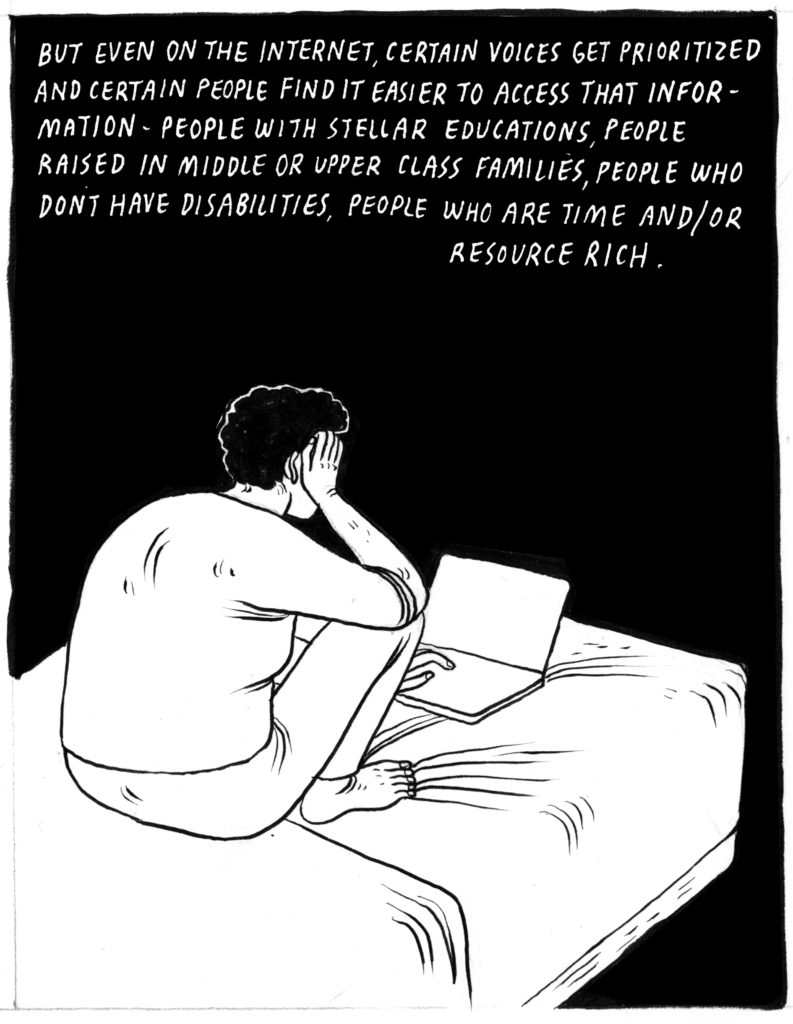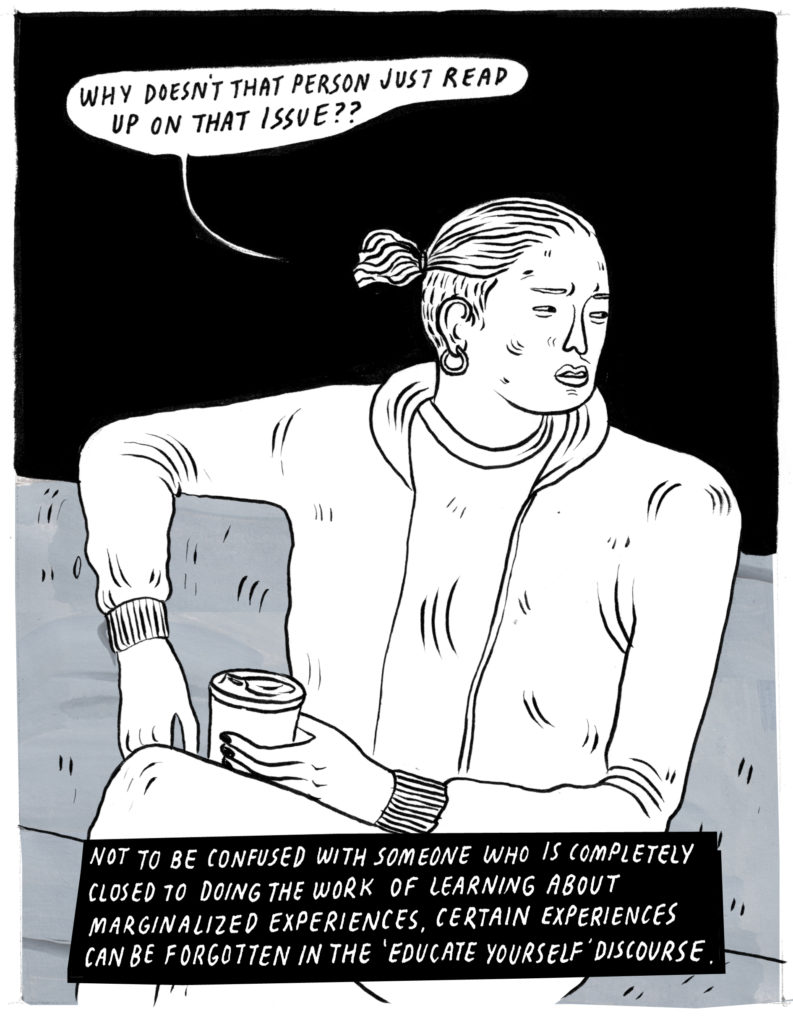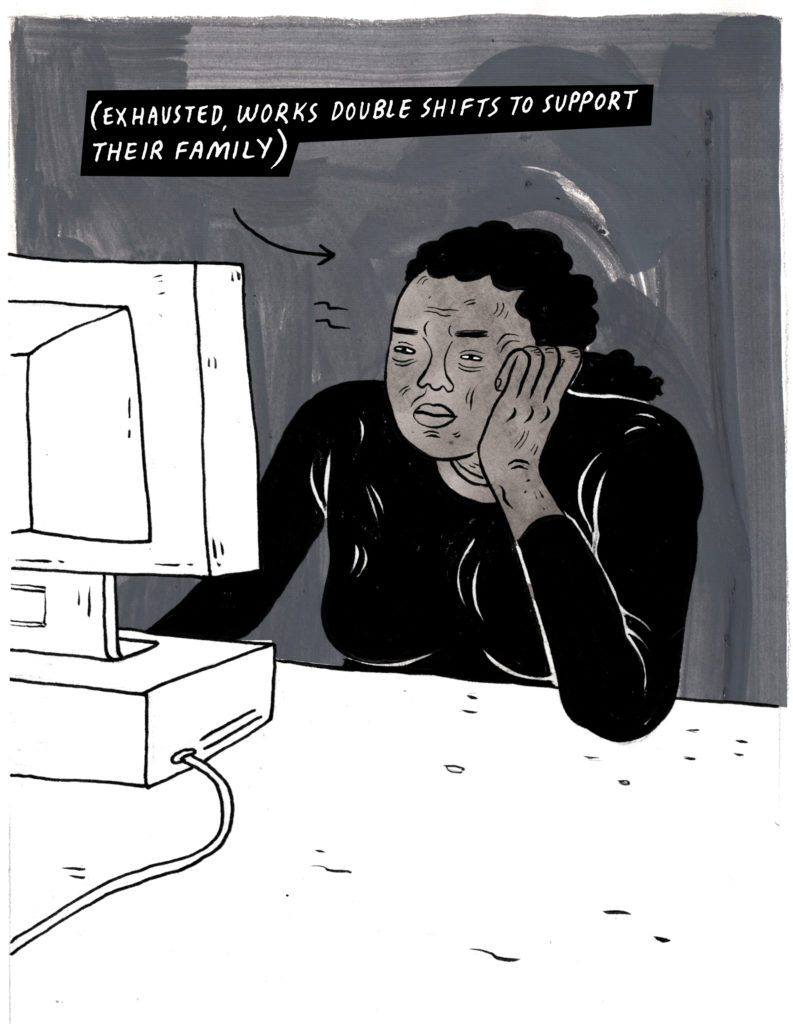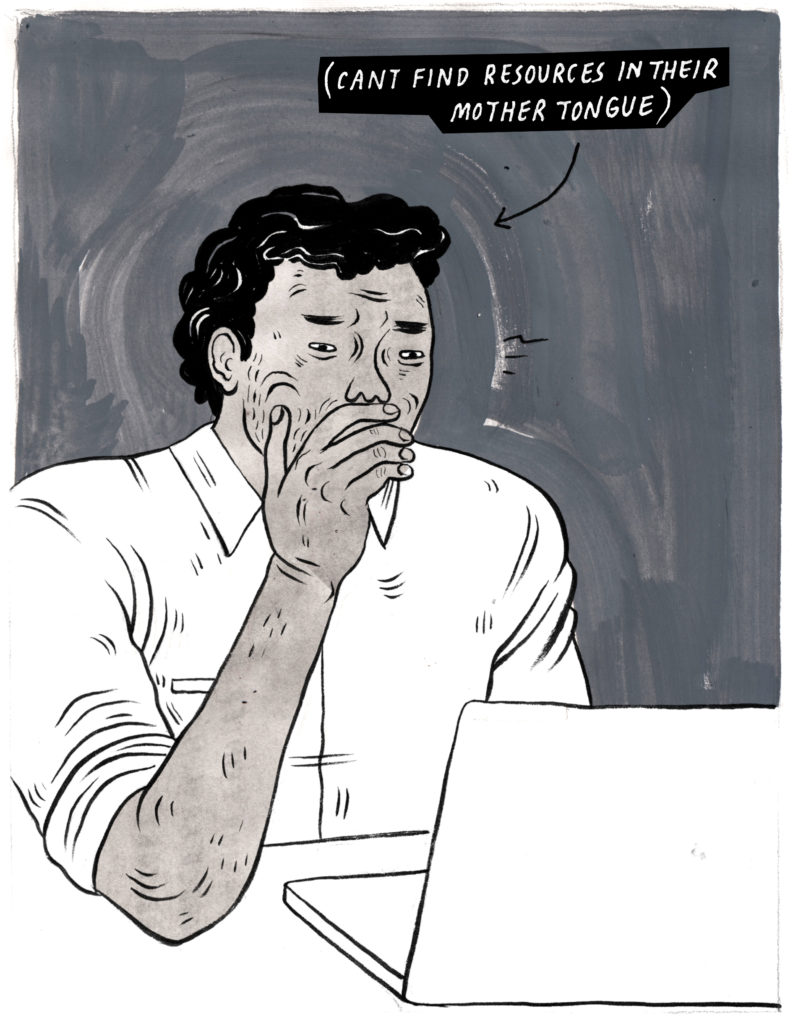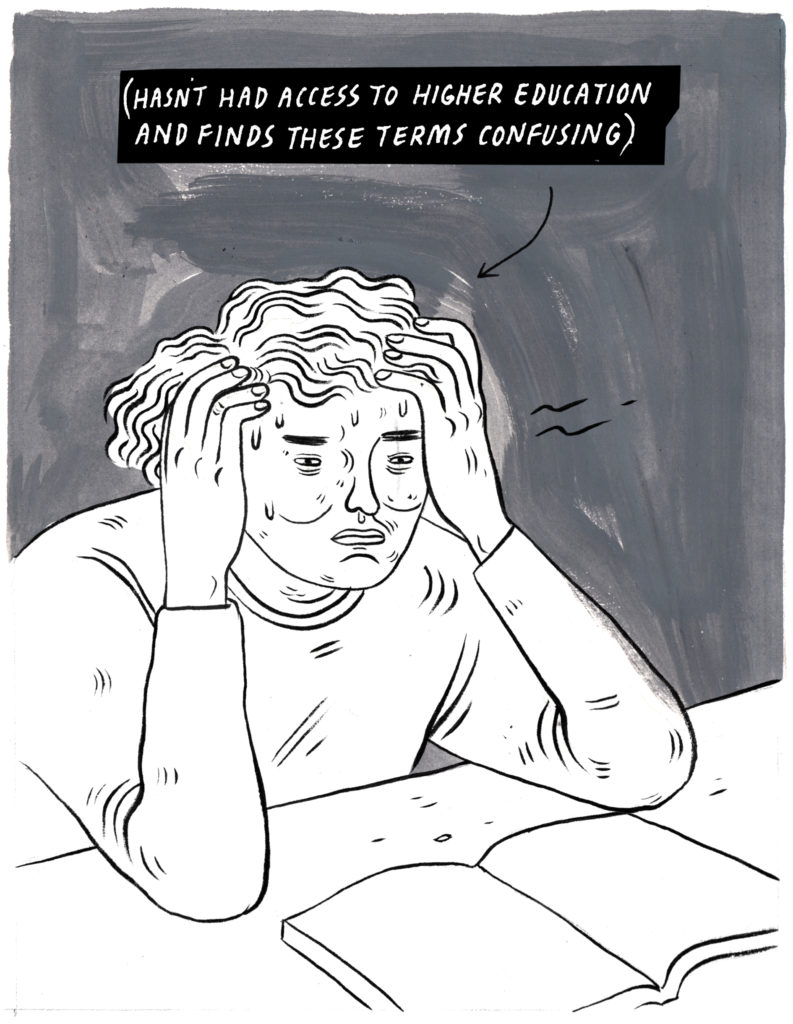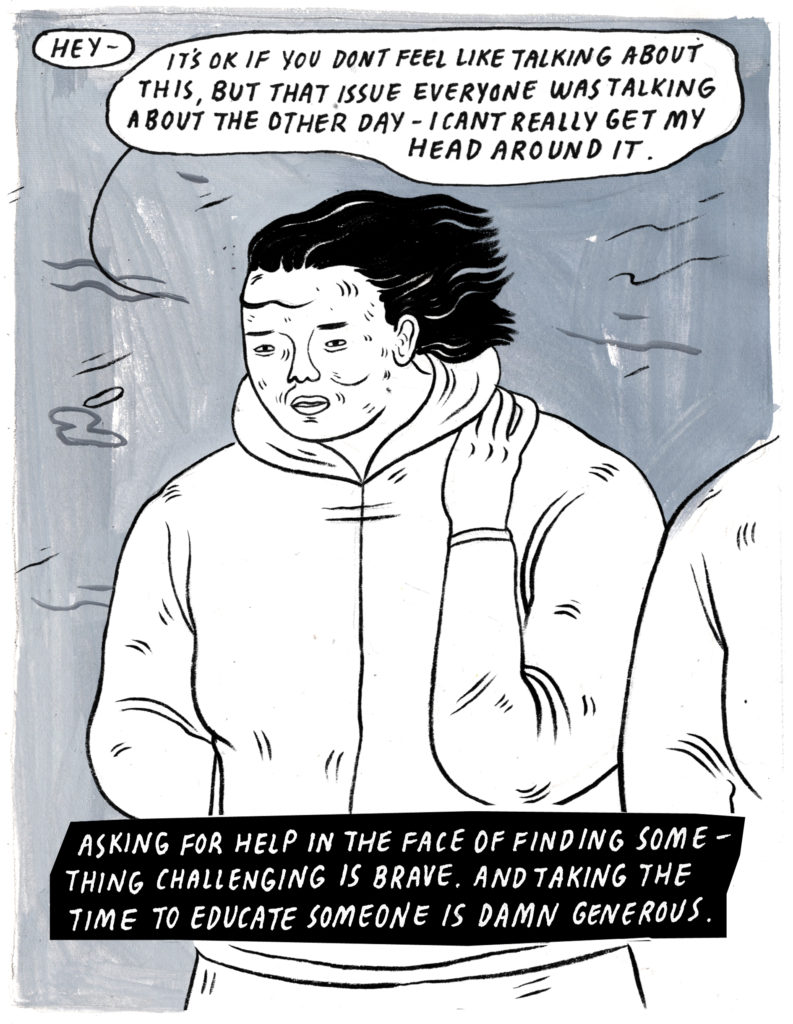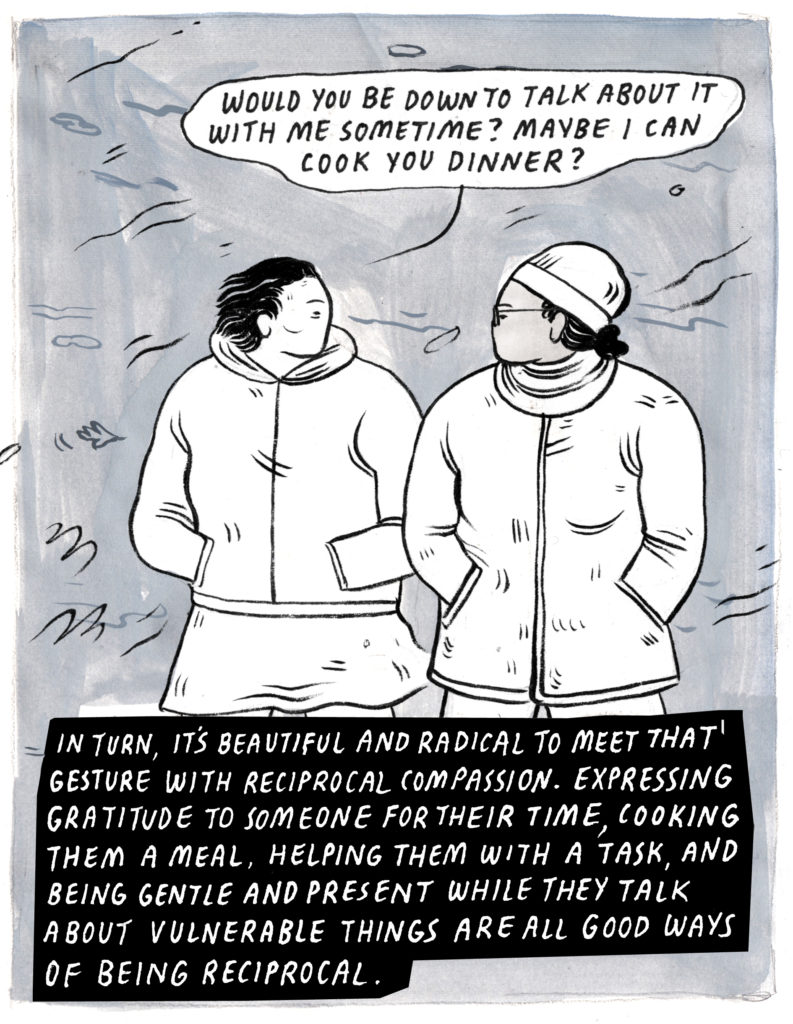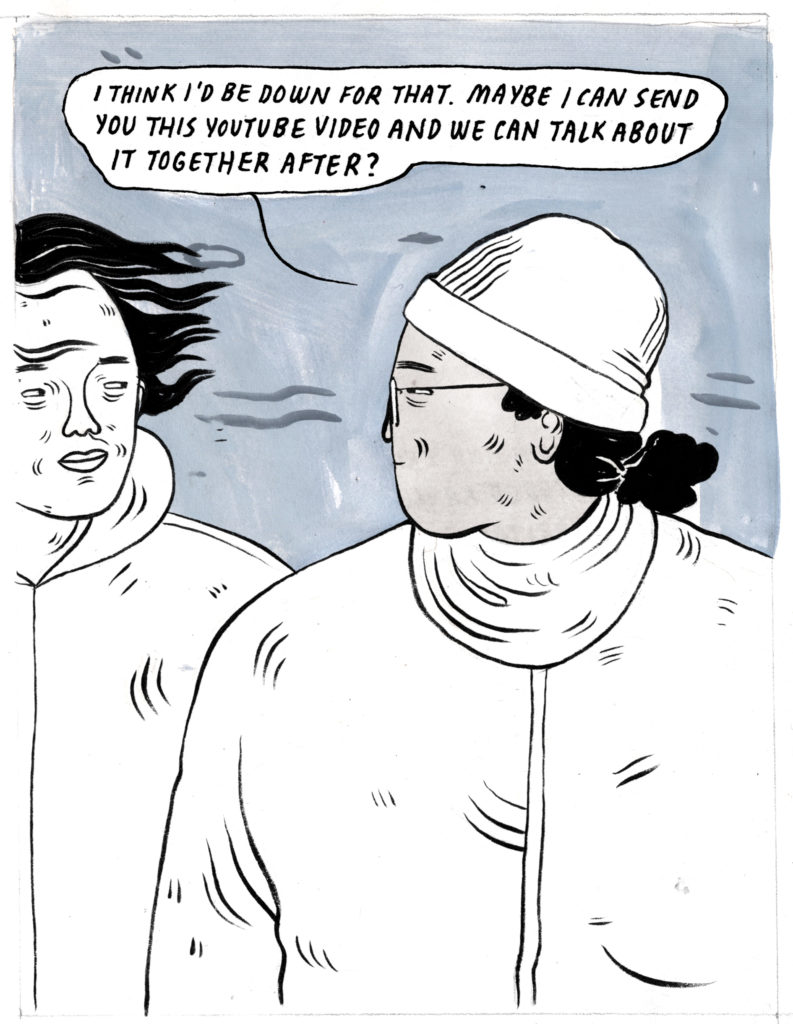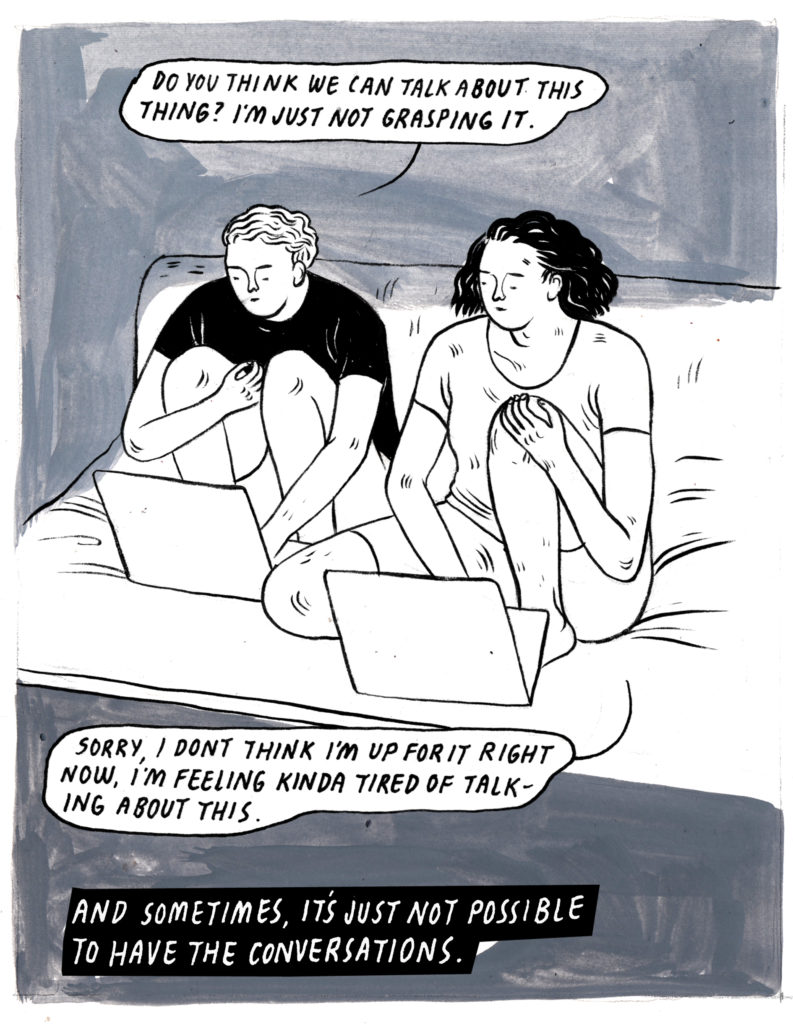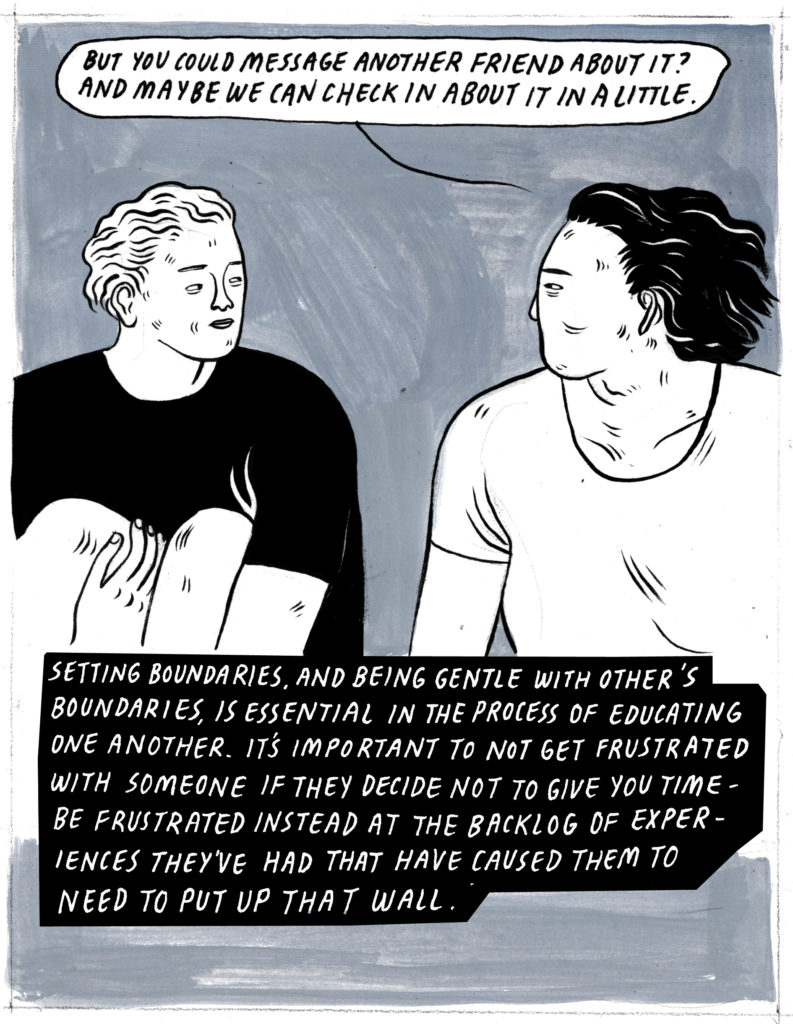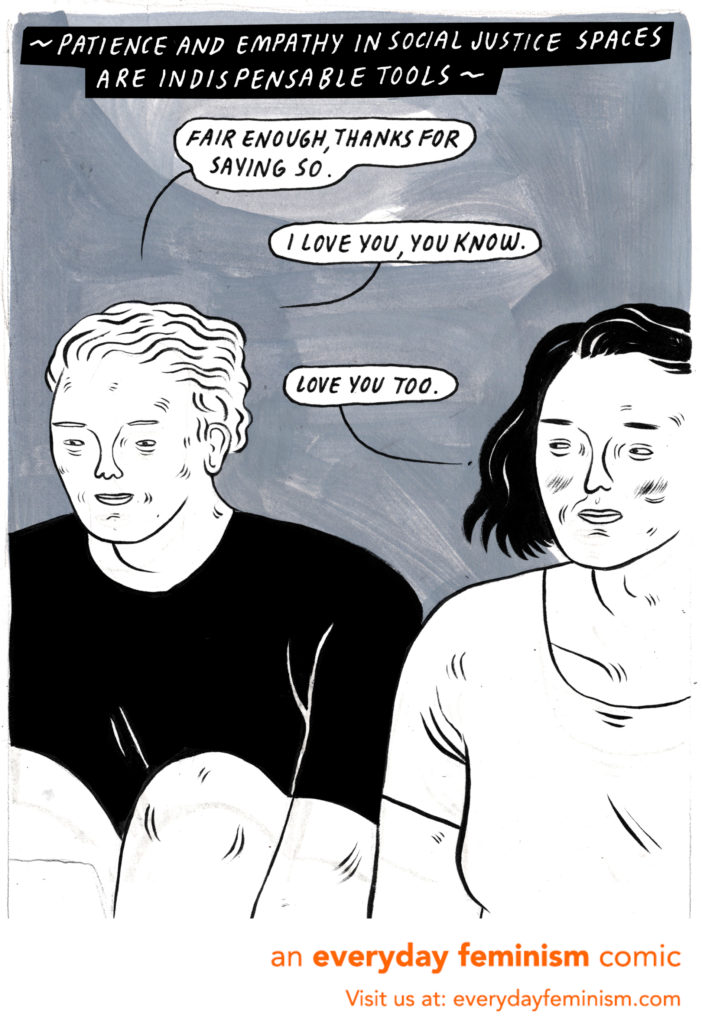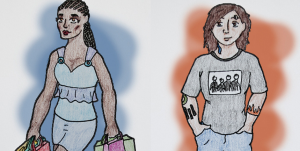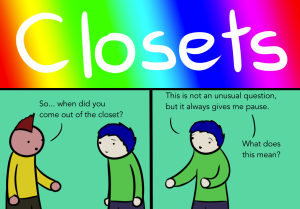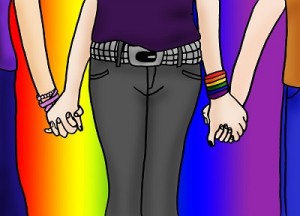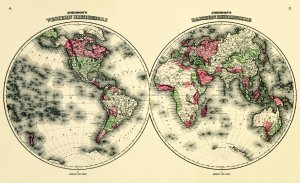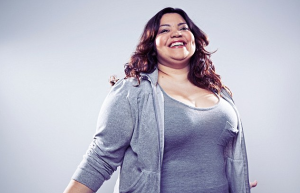Panel 1
(Image of a person, fed up and angry, eating a sandwich while looking sideways)
Text: I often hear the phrase…
Person 1: It’s not my responsibility to educate that person.
Text: This comes from such a real place of frustration, pain, and burnout!
Panel 2
(Image of same person, working in a kitchen, looking annoyed at their workmate who has white locs and a confrontational attitude)
Person 2: But why is it offensive? I have Black friends who don’t care about my hair.
Text: If you encounter someone trying to explain why they find a certain attitude, or concept, or behavior hurtful, I guarantee they have explained it a hundred times before!
Panel 3
(Image of a transgender person at school, who is trying to ignore a classmate leaning into their space)
Person 2: But why isn’t it okay to ask about your surgery? I’m open-minded. I’m trying to be supportive!
Text: Living a particular experience of being structurally oppressed means constantly educating others as to why and how that experience is real, valid, and deserving of empathy. It makes it hard to not greet these conversations without weariness or cynicism.
Panel 4
(Image of a person at a party, holding a drink and angling their body away from another person)
Text: These conversations are often triggering and anxiety-provoking because it means opening up histories of trauma with someone that might not even make you feel held and safe in this process.
Person 2: What are you talking about? “Exotic” is totally a compliment.
Panel 5
(Back in the kitchen, Person 1 is responding to Person 2)
Text: Redirecting people to books, zines, or Internet articles became an amazing way to avoid these super draining interactions.
Person 1: (speech bubble is a URL to an Everyday Feminism article on white people appropriating Black hairstyles)
Panel 6
(Back in school scenario, Person 2 is responding to Person 1)
Text: And these days, there is a wealth of information on the web to learn about these things.
Person 1: (speech bubble is a URL to a Slate article by a trans author who is discussing why it’s not okay to ask invasive questions about surgery)
Panel 7
(Image of a person, dark silhouette, sitting in bed lit up by their computer)
Text: But even on the Internet, certain voices get prioritized, and certain people find it easier to access that information. This typically includes people with stellar educations, people raised in middle- or upper-class families, people who don’t have disabilities, and people who are time- and/or resource-rich.
Panel 8
(Image of a college student looking annoyed)
Person 1: Why doesn’t that person just read an article on that issue?
Text: Not to be confused with someone who is completely closed to doing the work of learning about marginalized experiences, certain experiences can be forgotten in the “educate yourself” discourse.
Panel 9
(Image of a person on a computer, looking drained)
Text: (accompanied by an arrow pointing to that person) Exhausted, works double shifts to support their family.
Panel 10
(Image of a different person on a computer, looking frustrated)
Text: (accompanied by arrow) Can’t find resources in their mother tongue.
Panel 11
(Image of a third person on a computer, looking lost)
Text: (accompanied by arrow) Hasn’t had access to higher education and finds these terms confusing.
Panel 12
(Image of third person from previous scenario, approaching their friend)
Person 1: Hey, it’s okay if you don’t feel like talking about this, but I’ve thought about that issue our friends were discussing the other day, and I can’t really get my head around it.
Text: Asking for help in the face of finding something challenging is brave. And taking the time to educate someone else is damn generous.
Panel 13
(Image of same friends, sitting together)
Person 1: Would you be down to talk about it with me sometime? Maybe I can cook you dinner while we talk?
Text: In turn, it’s beautiful and radical to meet that gesture with reciprocal compassion. Expressing gratitude to someone for their time, cooking them a meal, helping them with a task, and being gentle and present while they talk about vulnerable things are all nice ways of being reciprocal.
Panel 14
(Image of same friends)
Person 2: I think I’d be down for that. Maybe I can send you this YouTube video, and we can talk about it together after you check it out?
Panel 15
(Image of different friends, from an earlier scenario)
Person 1: Do you think we can talk about this thing? I’m just not grasping it.
Person 2: Sorry, I don’t think I’m up for it right now. I’m feeling kinda tired of talking about this.
Text: And sometimes, its just not possible to have the conversations.
Panel 16
(Image of same friends)
Person 2: But you could message another friend about it? And maybe we can check in about it in a little while.
Text: Setting boundaries, and being gentle with others’ boundaries, is essential in the process of educating one another. It’s important to not get frustrated with someone if they decide not to give you time. Be frustrated instead at the backlog of experiences they’ve had that have caused them to need to put up that wall.
Panel 17
(Image of friends, one is looking back at their computer, one is glancing over)
Text: Patience and empathy in social justice spaces are indispensable tools.
Person 2: Fair enough! Thanks for saying so. I love you, you know.
Person 1: Love you, too.



